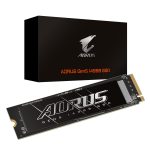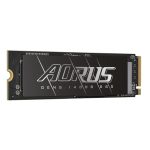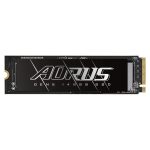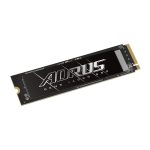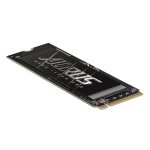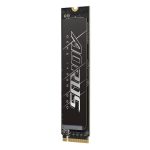Gigabyte recently unveiled its latest line of PCIe 5.0 SSDs, the Gigabyte Aorus 14000 Gen5. Available with up to 4TB of storage capacity, these new PCIe 5.0 SSDs are positioned as top contenders in the gaming SSD market. The fastest model can achieve sequential read and write speeds of 14.5 GB/s and 12.7 GB/s, respectively.
The upcoming SSDs from Gigabyte are set to feature Phison PS5026-E26 controllers and 232-layer 3D TLC NAND Flash memory. These flagship SSDs will be available in three storage options: 1TB, 2TB, and 4TB, with the middle option being the fastest. Each model comes with 2GB of LPDDR4 cache per TB of storage.
The Aorus Gen5 SSDs have sequential read speeds exceeding 14GB/s, meaning it's about 2GB/s faster than the previously released Aorus Gen5 SSDs. Furthermore, the write speed has also significantly improved, now clocking in at 12.7 GB/s. You can check the detailed specs of each model below:
| Model | Capacity (GB) | Sequential read speed (GB/s) | Sequential write speed (GB/s) |
|---|---|---|---|
| Aorus Gen5 14000 SSD 1TB (AG514K1TB) |
1000 | 13,6 | 10,2 |
| Aorus Gen5 14000 SSD 2TB (AG514K2TB) |
2000 | 14,5 | 12,7 |
| Aorus Gen5 14000 SSD 4TB (AG514K4TB) |
4000 | 14,1 | 12,6 |
All models have a rated MTBF (Mean time between failure) of 1.6 million hours and are backed by a 5-year warranty or 700 TBW per TB. Gigabyte has yet to disclose pricing details. However, given the high-end nature of these new SSDs, it's reasonable to expect a premium price point. For reference, the Aorus 12000 model is priced at £260 for the 2TB model and £180 for the 1TB model.
KitGuru says: Don't expect PCIe 5.0 SSDs to go much faster than the Aorus 14000 2TB model. Although the PCIe 5.0 x4 interface can theoretically transfer up to 16GB of data per second, a device can never fully use it due to data transport and I/O management overhead.
 KitGuru KitGuru.net – Tech News | Hardware News | Hardware Reviews | IOS | Mobile | Gaming | Graphics Cards
KitGuru KitGuru.net – Tech News | Hardware News | Hardware Reviews | IOS | Mobile | Gaming | Graphics Cards


